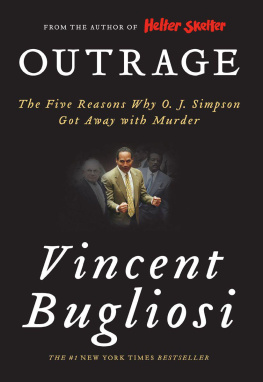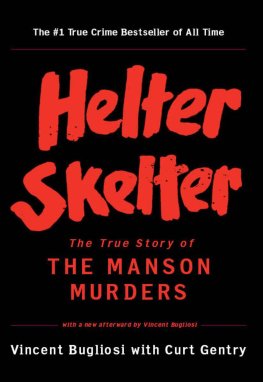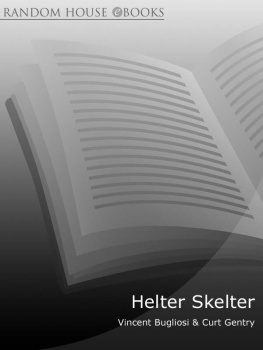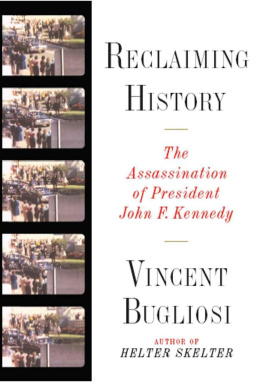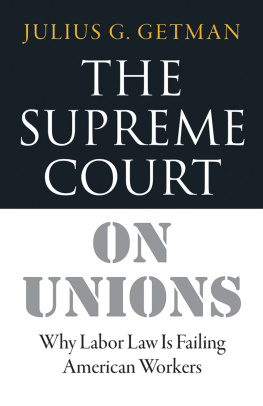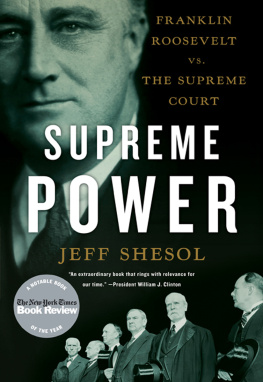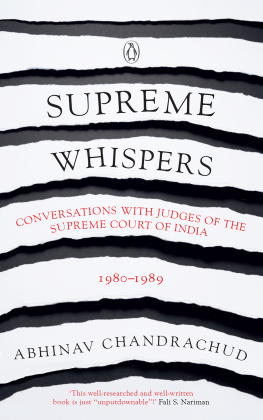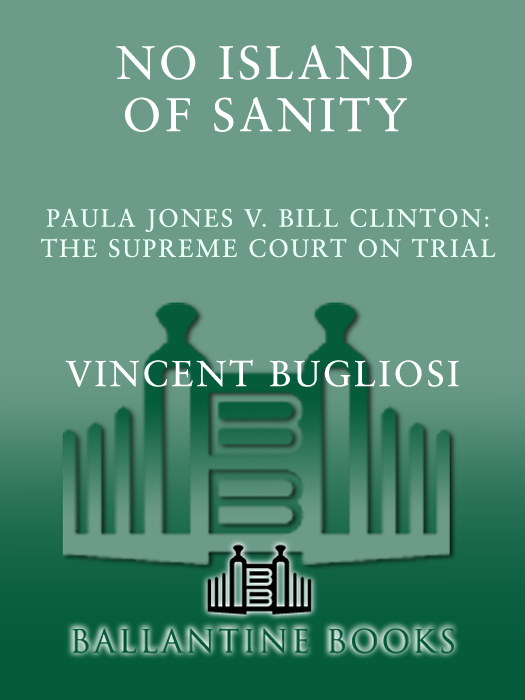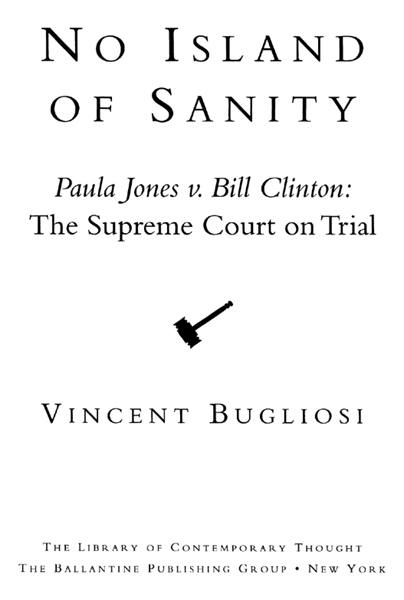T HE LIBRARY OF C ONTEMPORARY T HOUGHT
Americas most original voices tackle todays most provocative issues
VINCENT BUGLIOSI
NO ISLAND OF SANITY
Paula Jones v. Bill Clinton:
The Supreme Court on Trial
By the time readers finish this book Im confident that most of them will be highly condemnatory of the Supreme Court, some even angry at the Court, for its ruling in the Paula Jones case.
The highest court in our land made an incomprehensible and terribly flawed decision against the nations most powerful and important citizen, one that has injurious ramifications for all of us.
What conceivable argument could possibly be made for the proposition that Joness right to proceed to trial now with her private lawsuit is more important than the publics right to have its president be undiverted and undistracted in the performance of his duties running the country? No one answered that question in the Jones case for the simple reason that it was never even asked.
Also by Vincent Bugliosi
Helter Skelter (with Curt Gentry)
Till Death Us Do Part (with Ken Hurwitz)
And the Sea Will Tell (with Bruce Henderson)
The Phoenix Solution: Getting Serious About Winning Americas Drug War
Outrage: The Five Reasons Why O.J. Simpson Got Away With Murder
The Library of Contemporary Thought
Published by The Ballantine Publishing Group
Copyright 1998 by Vincent Bugliosi
All rights reserved under International and Pan-American Copyright Conventions. Published in the United States by The Ballantine Publishing Group, a division of Random House, Inc., New York, and simultaneoulsy in Canada by Random House of Canada Limited, Toronto.
http://www. randomhouse.com
Library of Congress Cataloging-in-Publication Data
Bugliosi, Vincent.
No island of sanity: Paula Jones v. Bill Clinton: the Supreme Court on trial / Vincent Bugliosi.1st ed.
p. cm.
eISBN: 978-0-307-77578-8
1. Jones, Paula, 1966 Trials, litigation, etc. 2. Clinton, Bill, 1946 Trials, litigation, etc. 3. Sexual harassmentLaw and legislation
United States. I. Title.
KF228.J66B84 1998
342.7308780269dc21 97-50261
v3.1
To those fellow Americans who respect and are concerned about the office of the presidency, irrespective of the political affiliation of its temporary occupants
Contents
P ART O NE
A Rather Long and Discursive Dissertation to Prepare the Reader for the Shocking Revelation (and Make the Reader More Receptive than He or She Would Normally Be to Agreeing with the Charge) that the U.S. Supreme Court in the Paula Jones Case Made a Ruling that Was Less Profound than What We Could Expect of Even a Layperson of Below-Average Intelligence

A S THE EXPRESSION goes when two people of opposite gender keep bumping into each other in different places, We have to stop meeting like this, or else people will start talking about us. Likewise, I have to stop pointing out to the American public things they never saw, otherwise people are going to start saying, as the Newsday review said of Outrage, my book on the O.J. Simpson case, Is everybody wrong but Bugliosi? Well, he makes a darned conclusive argument that this is so.
What Newsday was referring to was a rather remarkable thing. Prior to the hardcover publication of Outrage: The Five Reasons Why O.J. Simpson Got Away with Murder on June 10, 1996, no one, but no one, was blaming the prosecution for the not-guilty verdict in the Simpson case and pointing out their unbelievable incompetence. Although that incompetence (in many instances it went beyond incompetence into the area of unprecedented, unheard of, bizarre, unique) took place right before the eyes of millions and millions of television viewersincluding thousands of trial lawyersin the most publicized murder trial in American history, the overwhelming consensus was that the prosecution did all they could possibly do and the jury was completely responsible for what happened. (Those few who didnt say this claimed that the LAPD botched the case for the prosecution before it came to trial.)
As Newsweek told its readers on September 30, 1996, It is accepted wisdom that prosecutors lost the criminal trial virtually the day the predominantly African-American jury was sworn in. Yes, the accepted wisdom of all those who havent read Outrage. But as the Los Angeles Times said in its review, No one who reads this book will ever again believe that the most publicized acquittal in the history of American jurisprudence was solely the result of juror prejudice or the machinations of unscrupulous defense attorneys. The D.A. and the prosecutors have been called before the Bar of Justice. The New York Times Book Review said that Outrage puts the blame where it belongs.
Although Outrage is a very harsh indictment of the prosecutorial effort in the Simpson case, if theres one thing I take pride in, its that I never, ever make a charge without supporting it. You might not agree with me, but I invariably offer, as I will do in this book, an enormous amount of support for my position. How often do you read a declarative, assertive statement in the caption or first paragraph of an article and then search in vain in the article for the support? Either its not there or the support is anemic. Thats not my style. And in Outrage I offer page after page, example after example of incompetence so extreme that readers can only shake their head and say to themselves, How can this possibly be? and Why didnt I see this?
Let me say that the jury in the Simpson case was bad; major, big-time bad. The prosecutors were even worse, however. But as bad as the prosecutors were, people tend to forget that on the first ballot back in the jury room, a black juror and a white juror voted guilty. If you can get a ten-two vote on the first ballot with an extremely inferior performance, you can imagine, by extrapolation, what would have happened if there had been an A-plus performance by the prosecution, which the people of the State of California were entitled to. Im personally convinced that even this jury would have responded with a guilty verdict, or at an absolute minimum, a hung jury.
Because of the prosecutions staggering incompetence in the Simpson case his divergent reports raise questions about his credibility. You want to put him under oath and cross-examine him.
Most of the talking heads were known only to their immediate families and friends prior to the Simpson trial. An exception was Joe Di Genova, a bright and articulate lawyer and former prosecutor who previously had been the U.S. attorney in Washington, D.C., and who is a respected member of the legal profession. But after the verdict, when the L.A. Times asked me and three other prosecutors, including Di Genova, to write a statement on how we would have handled the case differently, I set forth some of what I later stated in Outrage, where I point out the astounding, shocking, and incredible errors made by the prosecutors. But Di Genova, who has said he watched every day of the trial on television, wrote: I dont have an answer to that question. He added: I think they did a damn good job under horrible circumstances. In other words, as far as Di Genova was concerned, the prosecutors in the Simpson case did all they possibly could. But Di Genova can now be heard on TV talking about the unbelievable incompetence of the prosecutors in the Simpson case.


